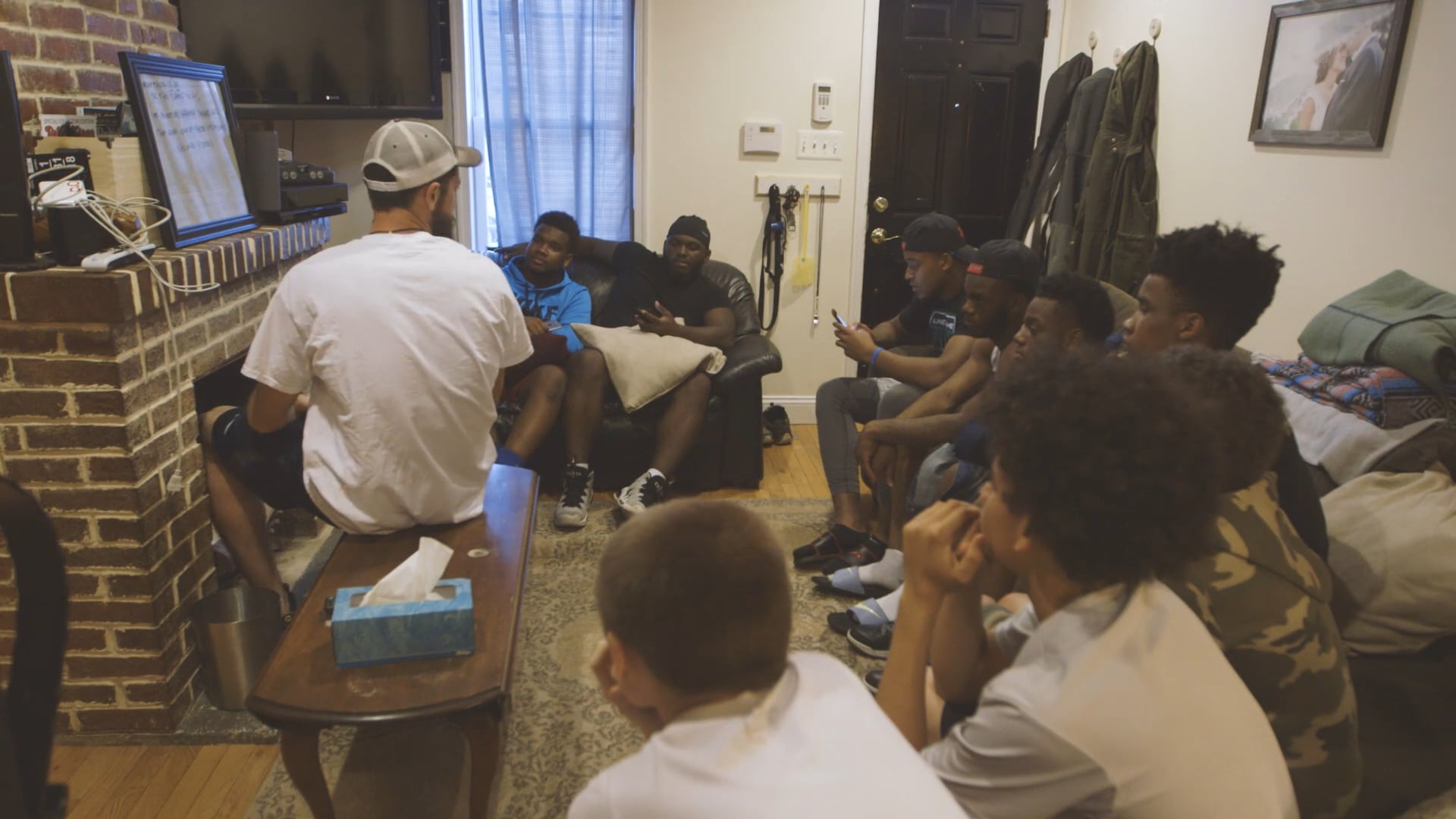Chapter 3 of West Baltimore: Rebuilding Mode
From Westford to West Baltimore
Everyone calls him “Coach”, but that’s not the only reason Sean Goodrich sticks out like a sore thumb in West Baltimore.
He remembers his hometown as being 99% perfect.
Sean Goodrich grew up in Westford, a suburb of Lowell, Massachusetts. Westford had most everything a kid like Sean ever wanted or needed. Everything, except for one thing. “I grew up in the suburbs. But even in my childhood, I was drawn to the city,” Sean remembers. “It was probably because I wanted to find really competitive games of basketball.”

In this image from home video, a young Sean Goodrich practices his form.
When he was a kid, Sean Goodrich wanted to grow up to be Larry Bird, the Hall of Fame forward for the NBA’s Boston Celtics. To sharpen his skills, Sean would take hoops pilgrimages to the inner-city of Lowell, looking for pickup games and volunteering his talents to anybody needing a tall, sweet-shooting kid from the ‘burbs’ who was willing to learn. Playing ball as a young person in urban environments prepared Sean for his life as an adult, but not in the way he imagined. “It wasn’t in my mind to grow up and live in the city,” he says. “It wasn’t until after I graduated high school when I came to know the Lord, and God put it in my heart to be in the city and be there for a reason.”

‘There’s a level of beauty in the city,” Sean says, “and unless you’ve lived there, you wouldn’t realize it.”
When Sean Goodrich moved to his West Baltimore row house in 2012, he discovered he wasn’t the only one moving to West Baltimore to build witnessing relationships. His neighbor, Jeff Thompson, was helping start a church in West Baltimore, and he invited Sean to a Bible study at his home. Jeff, Sean and others who attended that study would soon start Gallery Church, Sowebo. “I’d never been part of a startup church,” Sean says. “But it made me excited there were people who had that same mentality—that while we can send missionaries all over the world, there are hard places right in our own country, and we can love God and love our neighbor wherever we are.”

“Sometimes our differences can be what’s fun,” says Sean. “We get to learn from each other more than if we were similar.”
As one of the only white, suburban-raised evangelicals on his street, there were obvious racial and cultural barriers Sean had to overcome when he first moved to West Baltimore. His plan for overcoming those barriers and building trust with his neighbors was simple: unpack, settle in and then live the same inner-city life as those around him. It took several years, but that casual strategy eventually worked. “When you live in West Baltimore, you experience some of the same struggles. It doesn’t matter what your race is,” he says. “If somebody from the suburbs comes in and tries to listen to their struggles, people here would say, ‘You don’t know what I’m talking about.’ But people open up to me because they’re like, ‘You live in the city; you know how it is.’”

According to Dhati Lewis, pastor of a multi-racial and multi-ethnic congregation in Atlanta called Blueprint Church, living next to, close by or alongside someone of a different race or background is often the best way to develop empathy that mirrors the heart of Christ. In Undivided, a new Bible study helping churches and believers understand the role God calls for them to play in racial reconciliation, Lewis tells SBC President J.D. Greear, “A problem is not a problem until it’s your problem. And the way that happens is through two things: one is relationship and the other is proximity. A problem is a real problem if it’s close to you. Or it’s a real problem if it’s affecting someone who‘s close to you.”
Sean Goodrich learned this lesson firsthand. “On a race level, I can’t relate. I don’t understand the struggles that a black man goes through,” he says. “But I’ve just tried to listen and learn. It doesn’t matter what your race is, people want to be listened to, and they want their struggles to be heard. Living in a community and experiencing what the community experiences is a way of doing that.”

Leaving Westford for West Baltimore has not necessarily earned Sean the right to speak, but it has earned him the right to listen. And according to Lewis, that is an example the church should follow. “One of the things we talk about is that we seek to understand before trying to be understood,” says Lewis in Undivided. “Our country is divided, and the church shouldn’t be. The church should be united. This is the thing Jesus prayed for, that we would be one. And this is what the world needs to see.”
Download the free 5-week study, Undivided: Your Church and Racial Reconciliation.


